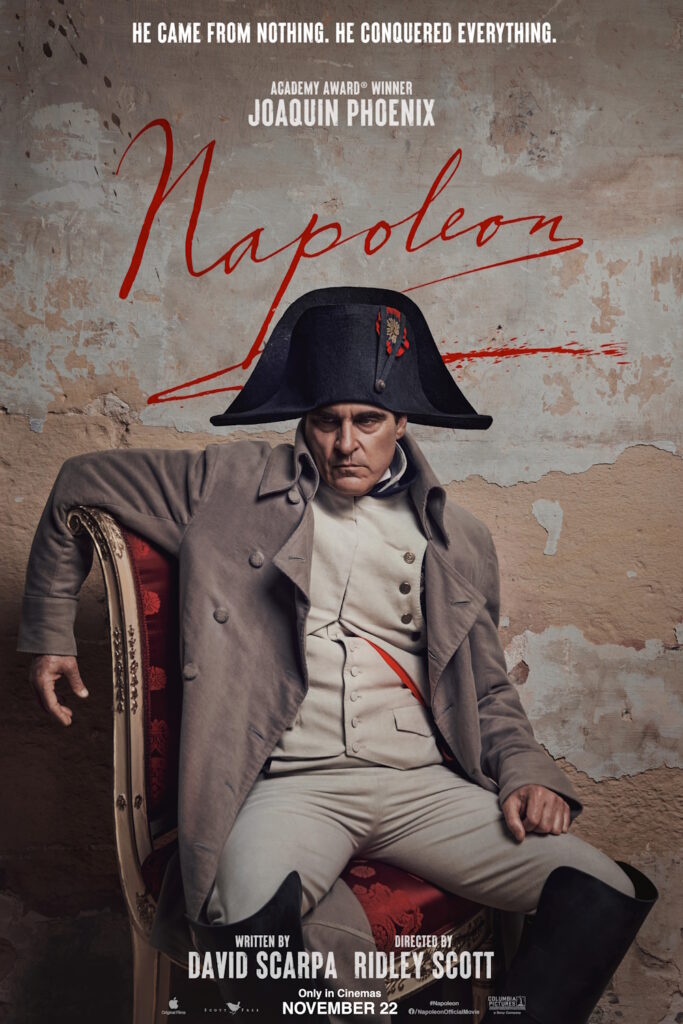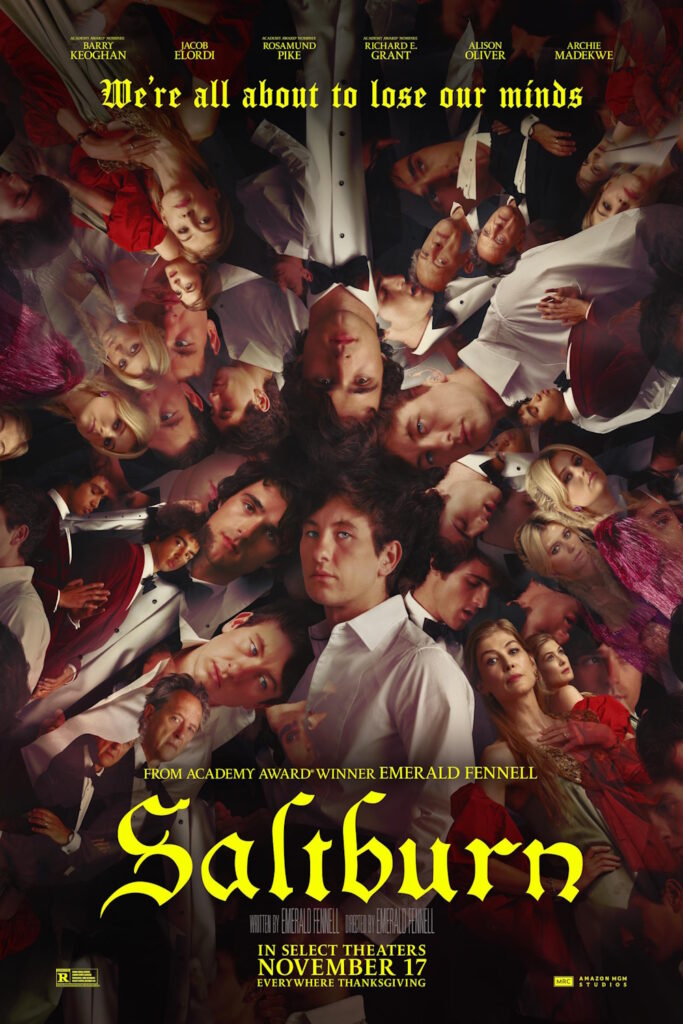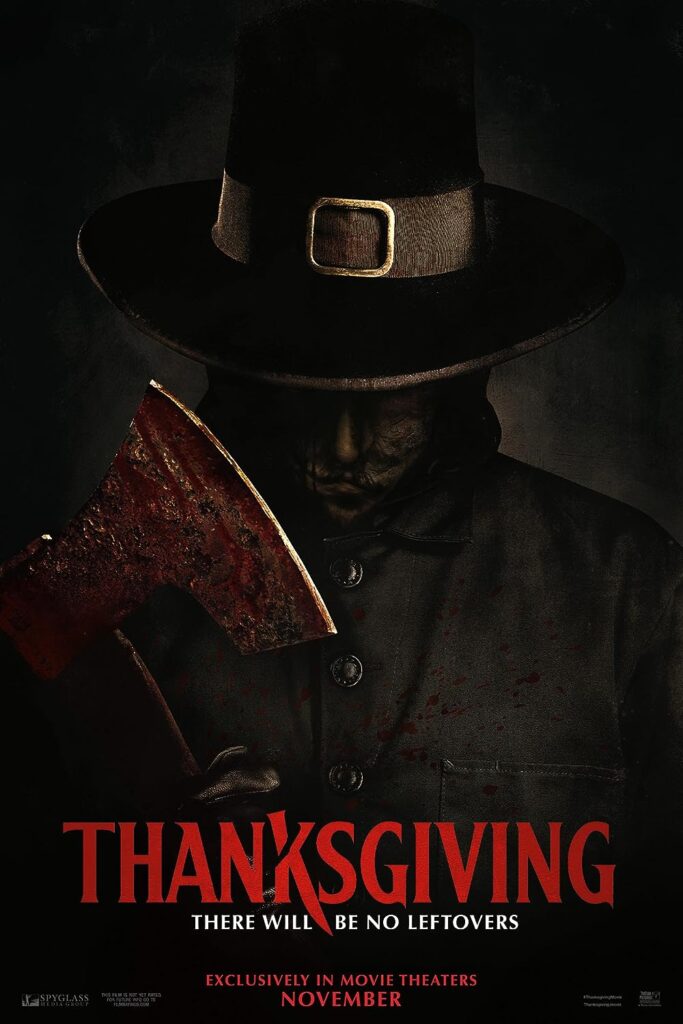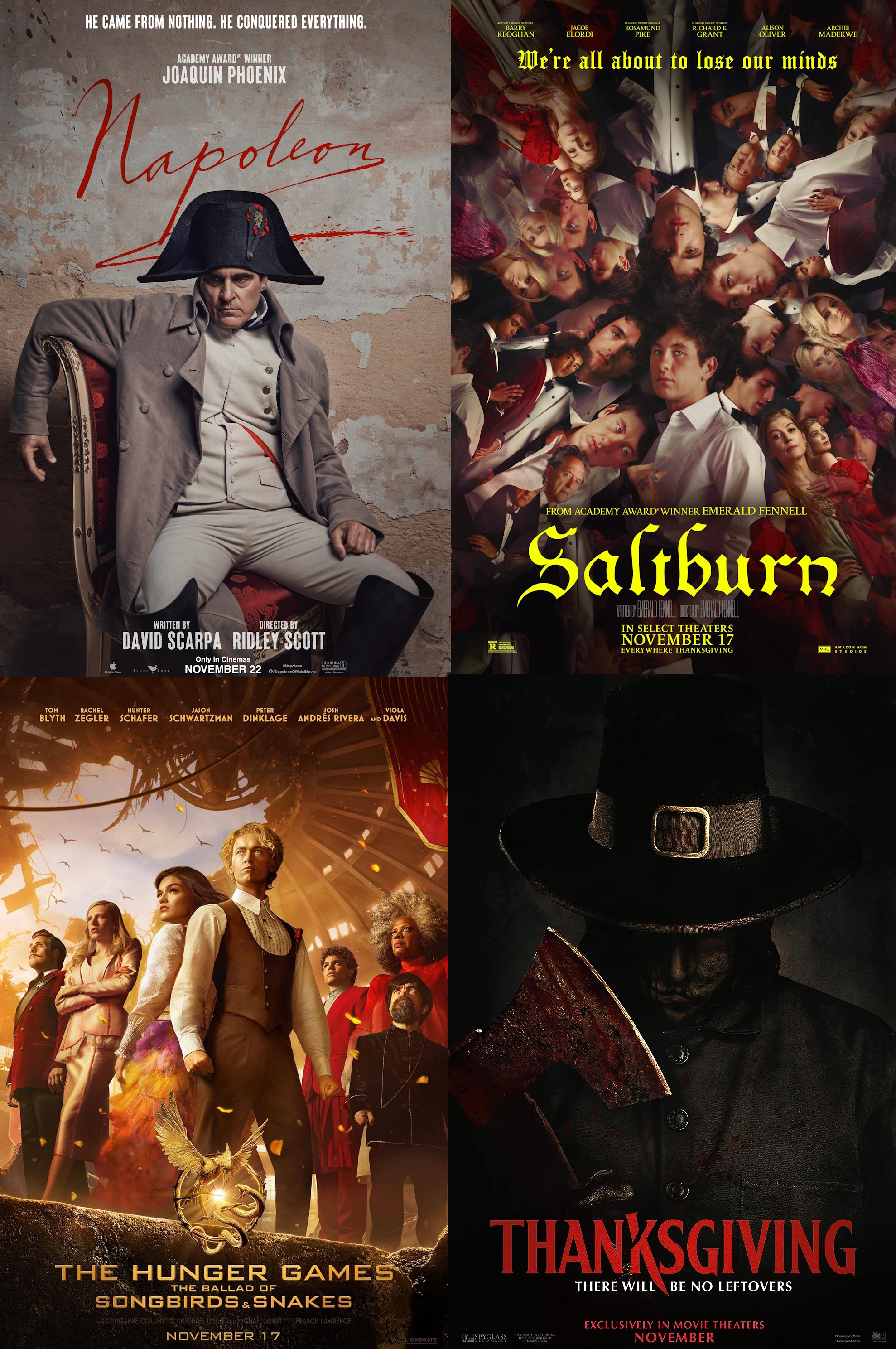
Napoleon
Ridley Scott is one of the directors who will go into the Cinematic Hall of Fame. His contribution to the art form is undisputed. From Blade Runner to Alien to Gladiator…I could go on. He’s one of those directors that makes you wonder how many films he’s got left. A question that he’s not arsed with answering himself. When asked if he could relate to Martin Scorsese’s concern of not knowing how many he’s got left in the tank, Scott just responded with, “No, I don’t think about it. I get up in the morning and say, ‘Ah great! Another day of stress.’” Which is fair. He’s made The Last Duel, House of Gucci, and this film while Scorsese worked on Killers of the Flower Moon. Oh, and he’s working on the Gladiator sequel. He’ll rest when he’s dead. Now, with his latest effort, he takes on the French leader, Napoleon; showing him in a very unflattering light.
You know what you’re getting when you watch a film called Napoleon – a film about Napoleon. Joining him as he begins rising the ranks of the French hierarchy, we watch the French revolutionist through battles over the course of his life and how he asserted his dominance across the world, showing his masterful tactician skills that Sir Alex Ferguson would probably study before a match. Although there’s no doubting his combat leadership, there’s one thing that he isn’t quite a master at: Relationships. His beloved Joséphine, a woman who seems to hold more power than he does, takes control of their relationship and turns him into a baby at times. She doesn’t seem to care all that much either that she holds such a grasp, but it’s the one battle that Napoleon just can’t win, and Napoleon doesn’t like losing.
Joaquin Phoenix portrays Napoleon as a stern leader in battle and a pathetic loser when he’s not getting his way as a bureaucrat – compared to Cesar with his strategies and compared to a baby with his attitude. Scott takes the mick out of the famous leader, showing his vain nature of showing off his achievements, while Joséphine couldn’t care less about them. There’s a nature of comedy to Phoenix’s performance too, as he falls down stairs or when he delivers lines about the English and their boats, you have to chuckle at how whiny this hero to many French people is. He’s able to make soldiers lay down their arms to fight for him, while simultaneously making a cinema audience laugh at his grimace. However, he’s nothing without Joséphine, and he would agree. Vanessa Kirby delivers something pretty impressive here. Not interested in his sexual advancements but is able to make him crawl on his knees under a table for her. It’s a performance that’s akin, yet separate, to Jodie Comer’s performance in The Last Duel.
Ridley has a history of making multiple cuts of his films. With Napoleon, he has stated that a four-hour cut of it exists. An extra hour-and-a-half to be viewed, separate from the theatrical edition. There’s an outcry at the moment that movies are too long, overstaying their welcome. But I must admit, I want that four-hour version of this film because there seems to be a lot left on the table. Mainly from the relationship between the two leads. I want to see it fleshed out that bit more. It is fine as is, however, it can seem a tad disjointed within the life of Napoleon as it hops around hastily to get to the next section of his “achievements”. I know I struggled to keep up at certain points, as there are quick interactions between important leaders, and the next minute, they’re enemies.
From battles on the dockside wall, across thin ice and muddy fields, Scott somehow has more energy than a lot of young directors working today. His age surely isn’t slowing him down. The action is brutal and visceral. You can taste the blood or legitimately think that a cannonball is going to blast through the screen and onto your lap. This epic brings the word epic to its battles. Hundreds of extras and horses charging at each other have never looked more glorious. And filthy too. It’s a cinematic joy to witness on the big screen; which is such a shame, since the four-hour version possibly will be stuck to Apple TV+. Still, Napoleon in its current form is worth a trip to the cineplex

Saltburn
Welcome to Saltburn: The mansion of your dreams that you’re allowed to stay at for the summer. This is the promise that Barry Keoghan’s Oliver is given from his new bestie, Felix (Jacob Elordi). After showing up to Oxford and realising that the only reason you get into such a university isn’t just due to good grades, the social outcast that is Oliver, has a meet-cute with Felix and begins to fit in for once. But after a death in Oliver’s family, the naive Felix decides to invite the Scouser to his place to stay for the summer. Typically, you’d expect a couch to be the most generous sleeping arrangement someone could offer, but in order to get to his bed, Oliver must travel between at least eight rooms before he arrives at his bedroom, which is roughly a ten-minute walk from the front gates. Bang average to the Catton family.
Following up on the Oscar-winning Promising Young Woman, director and writer Emerald Fennell has a lot of pressure placed upon her. It seems as if it got to her, as what could’ve been a fantastic sophomore effort which exceeded her debut turns out to be a lacklustre imitation of its predecessor. Coming off as more of a character story about a man, whose sexuality is left open as the fields that surround Saltburn, but is actually a bait-and-switch thriller. We see Oliver as a puppet, a pet, a people-pleaser because that’s what everyone around him sees him as, constantly being told that he’s better than “the last one” that Felix brought home. In order to not be as disposable to the family as “the last one” or as so many other things seem to be to the Catton’s, he gets in each of their good books anyway he can; whether it’s through complimenting their looks, having an intellectual conversation about art or feeding someone their own menstrual blood. There’s nothing too far for Oliver, who seems to be a puppeteer as opposed to the puppet.
The issue with this is his motive. There’s a clever move involving a house in Liverpool, but as it goes on, it seems to try and one up that. Why? I’m not sure. A closer look into Oliver’s character doesn’t supply the true reason. My only explanation is to invoke shock into the viewer with an unexpected outcome towards the end. Shock isn’t something that this film avoids, with scenes involving bath water and a grave, there are plenty of reasons to feel aghast. In between these moments are sharp lines from Rosamund Pike, playing the “need-to-know-it-all” mother while being ugly towards people. Ironic since her character has a fear of ugly people. The dark humour comes from the fact that the family are so ignorant of anything outside of their last name. Including where Liverpool is.
Even if the story is muddled, the production on display, and I mean on display, is grandiose. The mansion is immaculate and king-sized. So rich with detail due to the price tag. Showcased gorgeously through Linus Sandgren’s camera, using the 4:3 aspect ratio to give it the feel of one perfect picture – a dream summer away in Saltburn. It’s not real, it can’t be. Pushing the occupants in the frame closer together gives the feel of intimacy the story is crying out to achieve. From using the beauty of actors like Jacob Elordi and the stunning cinematography, Saltburn is a prime example of everything being on the surface with little underneath. Much like the MGMT needle drop, it’s time to pretend when within Saltburn, except there’s not much fun to be had in pretending to be a great film. Be one instead.

The Hunger Games: The Ballad of Songbirds & Snakes
It’s been over a decade since the world was taken over by Hunger Games fever. Releasing back in 2012, there wasn’t a schoolyard that you couldn’t enter without someone talking about it. Now, eleven years on from the first film and eight from the closing chapter in the saga, Francis Lawrence grabs the reins one more time to adapt the prequel book penned by author Suzanne Collins. Is this a case of something that would be better left in the past or can the Songbirds and Snakes sing one more ballad to set the world alight again like the girl on fire.
On the verge of the 10th annual Hunger Games, a young Coriolanus Snow – a role previously occupied by Donald Sutherland, who seemed to have a ball playing him in the previous entries; now played by an equally passionate and splendid Tom Blyth – is on the verge of graduating from his class and this close to getting money to support his family. Change of plans though. This class isn’t graduating based on grades, they’re graduating based on how well they will mentor the latest tributes in the Hunger Games. Snow gets appointed to mentor this bodacious, young girl from District 12, Lucy Gray Baird – a girl who won’t let you get away with pronouncing her name as “beard” instead of Baird. Who exactly is behind this girl? A sparkling Rachel Zegler, who now must fight for her life with the help of Snow if she’s to survive these games.
Due to this being set early in the history of the games, the arena and the pre-fight build-up aren’t quite the same as the one from 2012. Tributes are thrown into zoo pens to be gawked at. No training or even food for them. Being chosen doesn’t bring the luxurious benefits as it did for Katniss. As for the arena, it’s not adapting to whatever the Gamemakers decide to throw in there from a hologram. It’s a plain and simple gladiator arena. A treacherous circle for tributes to battle to the death in. And while the battle goes on inside the arena for Lucy Gray, there’s also a battle going on outside for Snow, who’s playing mind games and coming up with clever solutions to give Lucy Gray a chance of surviving this battle royale, which is where the magic of this film comes from, watching the two sides play out simultaneously. Bringing a unique perspective of what people behind the scenes are doing to help their tribute survive. Thanks to Tom Blyth, it’s just as, if not more engaging, than the actual battle going on. We watch him as we see an Anakin-to-Darth Vader transition. We know who he’s going to become, it’s just a matter of getting him there. With a prequel, you’re at a disadvantage with not having the element of surprise of where the characters will end up. But this film is a great example of a prequel: Building on the lore of the world without diving too much into fan service (with emphasis on too) all while giving a great standalone story for anyone not familiar with the books to enjoy. In fact, this film is possibly the best in the franchise.
It’s mainly through the performances in which the film shines. Tom and especially Rachel rock every moment they’re given. Zegler gives a stormer of a performance, both on the stage and off it. She’s a performer at heart and she’s been given the role of a lifetime by getting to bring such an outgoing, kind-hearted singer to life. If the electrifying performance from her isn’t good enough for you, I’d be extremely curious to see your standards. However, everyone hams it up in this. From Jason Schwartzman’s weatherman turned extravagant Hunger Games host which gives Stanley Tucci a run for his money, to Viola Davis’ manically evil Gamemaker, to Peter Dinklage as the vindictive creator of the games who has it out for Snow for reasons which aren’t explicitly stated until the end. Meanwhile, on the filmmaking side of things, Lawrence has it covered. At the beginning of the Hunger Games themself, the film utilises an extremely wide-angle lens to capture the wild and frantic start; swinging and swaying with Lucy Gray as she attempts to stay alive. It’s gripping, subjective filmmaking, all while coated in this warm colour palette, which gets traded out for a duller grade in the third act.
Speaking of the third act, this is when it gets dicey. Even if you’re not that savvy with story structure, you’d still be able to tell when it happens due to the film being split up into three title card-plated parts. Each part has its own unique stamp. After two solid acts, we’re then tossed into an extremely unfamiliar yet familiar territory. The issue with this section of the film is that it needed more time to breathe and feel livelier. Even with an hour left of the film, it still feels compacted, rushed and squished. A sharp note to a carefully crafted ballad up to this point. It’s so close to being fantastic but fumbles the transition of student Snow into the future tyrannical leader of Panem. Is this his fate or was this his choice? We’re not sure by the end. With a clearer outlook at the tail end of the film, this ballad would’ve been the finest of tunes, one fitting for a revolution.

Thanksgiving
On the eve of Black Friday, two separate families sit down at their respective dinner tables to have their Thanksgiving turkey. One family is quite wealthy due to owning a store that’s the equivalent of a Target or Walmart, which is just about to open at midnight for the sales. The other family isn’t as well off, with the husband having to go off to work this dreaded shift of managing the store. When he arrives, there is a horde of zombies – sorry, an extremely large crowd of people – trying to push over barriers to get inside for the 20% discounts. He then directs his employees to prepare as if they were on the beaches of Normandy and were about to get stormed by the British.
Oh, and the teenage daughter of the owner stumbles into the store before it opens with her friends to pick up a few things, which in return, incites a riot, causing the crowd to rush the store and break in prior to it’s opening. If you’ve seen clips online of the hellscape that being in a superstore on Black Friday is, just imagine that same energy, but with people getting brutally trampled to death and run over by trolleys. Cut to a year later after the horrific incident, a masked killer arrives on the scene and starts murdering the people who were involved in the Lion King-esque stampede into the store.
Eli Roth manages to make the opening fifteen minutes or so quite tense. The unrest from the crowd as the group of teenagers sneak into the store, it’s all palpable. When the barriers finally give way, the real horror kicks off as we bear witness to how capitalism turns people into savages, doing anything to try and save money. It’s an insane opening and I was sucked in to see where it goes. Sadly, that turns out to be possibly the high point of the flick. What follows next is the slasher formula. You got jocks, you got nerds, you got suspects, you got parties, you got “We’ll be right back”.
Roth’s key attribute of overly grotesque gore is in full effect here. Ludicrous in nature but not nearly as preposterous to make you laugh. The only way they’re comical is if you find a bin slamming on someone, resulting in them getting chopped completely in half, hilarious. It’s slasher shlock, which was a complete 180 from the social commentary Roth was trying to provide with the opening, even if that went over the top, too.
Credit where credit is due, the special effects look great here. I was impressed to see the use of practical, as opposed to digital effects for the kills. When a neck gets snapped backwards, you can see the wrinkles in the skin. You can also see the wrinkles on the dialogue. It feels so old with how lazy and on the nose it is. Like it’s been taken directly from a B-movie slasher from the ‘80s. Characters don’t feel like real people in this. The ones that do in fact feel real, you root for their downfall with how obnoxious they are.
In between the poor jump scares (I’m looking at you, school hallway scene) and the haphazard editing, there are glimmers of hope in scenes, like the cabin lodge, a moment filled with real tension and more importantly, good filmmaking. Those brief glimpses are few and far between, as the story cuts to scenes which feel contrived to set up the bare minimum stakes for the characters, lacking grace or fluidity.
Learn from Scream and put the main characters in danger, as opposed to the killer posting ominous Instagram posts and mentioning them in it. They should be chased, not tagged. But the film does what it wants to do well. A sleazy, schlocky slasher with gruesome kills, if that’s enough to fill you, that’s good. If not, then this film will feel like much ado about stuffing.

Dale Kearney is the Film Editor for Post-Burnout, and is a passionate film enthusiast, boasting multiple years studying and working within film, with an intrigue in all genres of film, from horror to comedies to musicals.

 POST-BURNOUT
POST-BURNOUT